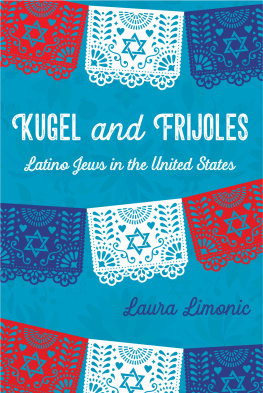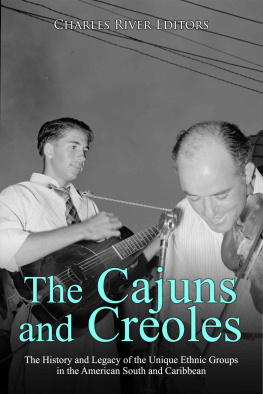Louisiana Creoles
Louisiana Creoles
Cultural Recovery and Mixed-Race Native American Identity
Andrew J. Jolivtte
Foreword by Paula Gunn Allen

LEXINGTON BOOKS
A division of Rowman & Littlefield Publishers, Inc.
A wholly owned subsidiary of The Rowman & Littlefield Publishing Group, Inc.
4501 Forbes Boulevard, Suite 200
Lanham, MD 20706
Estover Road
Plymouth PL6 7PY
United Kingdom
Copyright 2007 by Lexington Books
All rights reserved. No part of this publication may be reproduced, stored in a retrieval system, or transmitted in any form or by any means, electronic, mechanical, photocopying, recording, or otherwise, without the prior permission of the publisher.
The hardback edition of this book was previously catalogued by the Library of Congress as follows:
Jolivtte, Andrew, 1975
Louisiana Creoles : cultural recovery and mixed-race Native American identity / Andrew J. Jolivtte ; foreword by Paula Gunn Allen.
p. cm.
Includes bibliographical references and index.
1. CreolesLouisianaEthnic identity. 2. Indians of North AmericaLouisianaEthnic identity. 3. Indians of North AmericaMixed descentLouisiana. 4. BlacksLouisianaRelations with Indians. 5. LouisianaEthnic relations. 6. LouisianaRace relations. I. Title.
F380.C87J65 2007
305.8009763dc22
2006030111
ISBN-13: 978-0-7391-1896-2 (cloth : alk. paper)
ISBN-10: 0-7391-1896-X (cloth : alk. paper)
ISBN-13: 978-0-7391-1897-9 (pbk. : alk. paper)
ISBN-10: 0-7391-1897-8 (pbk. : alk. paper)
Printed in the United States of America
 The paper used in this publication meets the minimum requirements of American National Standard for Information SciencesPermanence of Paper for Printed Library Materials, ANSI/NISO Z39.48-1992.
The paper used in this publication meets the minimum requirements of American National Standard for Information SciencesPermanence of Paper for Printed Library Materials, ANSI/NISO Z39.48-1992.
In memory of my aunt, Joelle Jolivtte-Gonzlez, and Dr. Lionel Cant.
In dedication to my parents, Annetta Foster-Jolivtte and Kenneth Jolivtte.
In honor of my relations, the Jolivtte-Guidry and Fontenot-Guillory families of southwest Louisiana.
Contents
Figures
Tables
Acknowledgments
First and foremost, I want to acknowledge and thank my dissertation committee, John Brown Childs, Craig Reinarman, Howard Pinderhughes, and Lionel Cant at the University of California, Santa Cruz and San Francisco campuses. Much of this book is based on my original dissertation research while I was a doctoral student in the sociology department at the University of California, Santa Cruz. They offered me constant feedback and encouragement about the lens through which I could not only investigate and understand Creoles of Color, but they often reminded me of the larger significance for rethinking racial formation, racial identity, ethnic relations, and ethnic resurgence theories. Their careful guidance allowed me to take a path that was not only intellectually and politically meaningful, but life changing.
I especially want to thank and dedicate this project to the memory of Lionel Cant who was a member of my qualifying exam and dissertation committees. Lionel passed away before the completion of this project and Craig Reinarman graciously agreed to join the committee after Lionels passing. If it were not for Lionels unwavering support upon the completion of my qualifying examination and during the early stages of my dissertation research I would not have seen this project to completion, so I will always cherish and honor his memory and academic legacy.
The Louisiana Creole Heritage Center in Natchitoches, Louisiana, at Northwestern State University, which acts as a research unit for the academic world as well as the general public, provided me with the ideal field site location. The administration and staff were unbelievably helpful in answering my questions, providing me with access to archival data, community resources, and contacts. In particular, Janet Ravare-Colson, Tracy Colson-Fontenot, Dr. Hiram Pete Gregory, Louise Llorens, and Michelle Pichon were extremely welcoming and made themselves available to assist me with my various needs which ranged from finding a place to stay to locating key people doing work on the forty or more Creole colonies of Louisiana.
The St. Augustine Historical Society (with much respect for Terrel Delphin) and the Louisiana Folklife Center (especially Dr. Dayna Bowker Lee, the regional folklorist) were also important resources for gaining key insights into the historical as well as contemporary experiences of Creole people outside of the New Orleans area. I am indebted to John Sarpy for sharing his book, A Slave, a Frenchman, and the Blood of a Saint. I would have, however, never been able to make my important journey to Louisiana without the support and direction of my wonderful family in Raywood and Liberty (just outside of the Houston, Texas, area). My cousin Beverly Miller-Fontenot, her husband Anthony Tony Fontenot and their daughters Jol and Talorie took time out of their busy lives to show me around Texas and to drive me through Lake Charles, Lafayette, Opelousas, Mallet, Lawtell, Eunice, and Natchitoches, Louisiana. They offered me a place to stay, important guidance, and advice about how to gain the most information about the history, travel, and expansion of the Creole community and culture in Southeastern Texas and in Western and Southwestern Louisiana. My cousin Cindy Papillion-Honor and her husband Phil Honor were also kind enough to let me spend time in their home and with their family (Jay and Danielle Honor their children were both great, especially Jay who drove me to various places I needed to go). I am especially grateful to Phils mom, Dorothy Metoyer-Honor, for sharing her valuable family history with me for inclusion in this book.
Throughout my professional and graduate career, I have had the good fortune to work with several professors, students, and important research institutions that have in some way influenced my thinking about Sociology, Creoles/Creole Studies, Native American Studies, Ethnic Studies, Womens Studies and the study of culture in U.S. society. They are many and I apologize for any unintentional exclusions from this list: Tomas Almaguer, Jim Okutsu, Clay Dumont, Amy Sueyoshi, Rafael Diaz, Melissa Nelson, Joanne Barker, Norma Alarcn, Bettina Aptheker, Paula Gunn Allen, Troy Johnson, Dana Takagi, Herman Gray, David Wellman, Angela Gonzales, Michael Tsosie, Rebecca Chiyoko King, Michael Webber, Ester Madriz, Michael Stanfield, Anne Roschelle, Judy Kertesz, Malinda Maynor, Deron Marquez, Sara Sutler-Cohen, Clarissa Rojas, Suresh Appavoo, Marci Takumi, Mary Rose Fernandez, Ron Brown, Mayra Castro, Ixayan Baez, Alfredo Pedroza, Ventura Rodriguez, Lloyd Lewis, Edgar Callo, Kuni Hay, Phaizon Wood, Dessie Gallardo, and Dennis Kim (especially for use of your laptop computer).
I am also indebted to the following institutions for their support: The Ford Foundation for a postdoctoral fellowship which allowed me to complete this project and secure important release time from my teaching duties at San Francisco State University; Northwestern State University of Natchitoches, Louisiana, in particular to Ms. Mary Linn Wernet; the College of Ethnic Studies at San Francisco State University, especially former Dean Toms Almaguer who offered constant feedback and support throughout this enormous endeavor; Acting Dean Ken Monteiro for providing financial support from the College of Ethnic Studies, and Provost John Gemello and the SFSU administration for a Vice-Presidents Assigned Time Award and Mini-Grant; Ms. Katie Bordelon, archivist at McNeese State University of Lake Charles, Louisiana; the University of California at Santa Cruz (particularly to the Graduate Division for an academic fellowship); UCSF; UC Berkeley; and UCLA (
Next page




 The paper used in this publication meets the minimum requirements of American National Standard for Information SciencesPermanence of Paper for Printed Library Materials, ANSI/NISO Z39.48-1992.
The paper used in this publication meets the minimum requirements of American National Standard for Information SciencesPermanence of Paper for Printed Library Materials, ANSI/NISO Z39.48-1992.